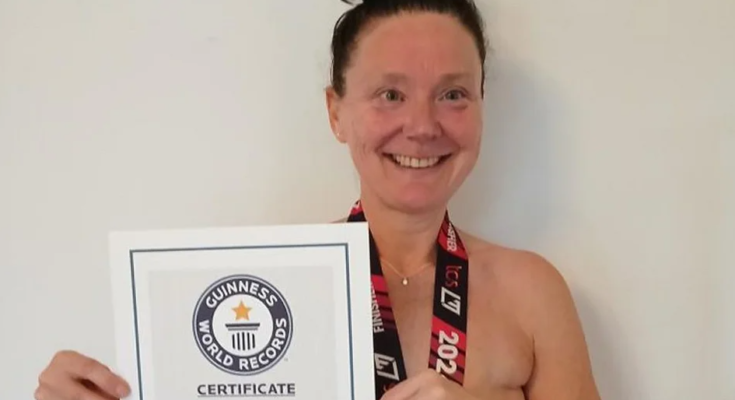Louise Butcher has made the Guinness Book of World Records by being the fastest marathon runner with a double mastectomy. This is an accomplishment that has changed her life.
The new record holder, who had been diagnosed with breast cancer, said she managed to accept her new body after the double mastectomy with the help of running the London Marathon. She has now dedicated her life to running and motivational speaking.
“What I wanted to do is normalize the mastectomy,” the 51-year-old marathon runner from North Devon, England, told US magazine People.
“Records are there to be broken; so Guinness found a record that I would be the fastest woman with a double mastectomy,” the self professed “topless runner,” as she states in her Facebook profile, said.
Now her next goal is to make women with double mastectomy accept their body as well. “That’s what I wanted—for women to want to beat it,” she told People. “It’s just part of normalizing mastectomy and not having breasts.”
Mastectomy without reconstruction
Like a modern-day Amazon warrior, after her physical and mental recovery from the double mastectomy operation, Louise said she feels more “liberated” now that her chest is not weighing her down when running. “I found there were advantages, let’s be honest: I didn’t have to wear a bra when it was hot. I wasn’t sweating. So I thought I’d show the bright side. And more importantly the fact that I’m still alive.”
Butcher was diagnosed with an extremely aggressive breast cancer that didn’t show up on a mammogram just weeks before she felt “a tiny lump.” The mother-of-two, then 49, went to a clinic for an ultrasound, where “they discovered five mysterious areas that looked abnormal.” A biopsy showed cancer that had started in the mammary glands. By the time she had the double mastectomy, the tiny lumps “had grown to five centimeters.” That’s how fast they were spreading.
The English woman spent the next six months mourning for the body she had lost. “I regretted losing the body I had,” she said. Yet, one of the things that helped her accept her new body was running. She had started running before the surgery, but, afterwards, she set her sights on a marathon.
The decision to run topless came after the 51-year-old noticed a general “negativity” surrounding mastectomy surgery without reconstruction in her social circle.
“People talk about losing your femininity, losing your sense of self, of being a woman, and it just felt like there was nothing positive about it,” she said.
It was her determination at the end of her period of mourning to turn her disadvantage into something positive: to start running. Running the marathon that put her name in the Guinness Book of World Records was the beginning of a new life for her.
The topless London Marathon run
Her decision to run topless in the London Marathon on April 24th was liberating for Butcher. “I felt free to run without a top, with no chest throbbing, and I really liked being flat,” she told People.
More importantly, however, running topless empowered her and helped her accept her new body without feeling funny about others seeing her. The Guinness Book of World Records achievement was just an added bonus.
Butcher came out stronger after dealing with the psychological effects of a double mastectomy. In her Facebook profile, she identifies herself as a “motivational speaker” and “topless runner.”
Her aims are quite ambitious, but they come from the heart. She speaks on topics such as: The Normalization & Choice of Bilateral Aesthetic Flat Closure, Post Breast Cancer; Promoting Body Positivity, Authenticity & Exercise; and Breaking down Stigma & Negativity Surrounding Mastectomy. She also pushes boundaries to open up much needed discussion about breast cancer and societal norms surrounding women and their bodies.
Butcher feels happy and rewarded when she sees that she helps other women with their self-image and changing their mindset as they follow her example. For now, she looks forward to continuing marathon running and expects to see more women overcoming double mastectomy and other health problems so as to continue living their lives to the fullest of their ability.



